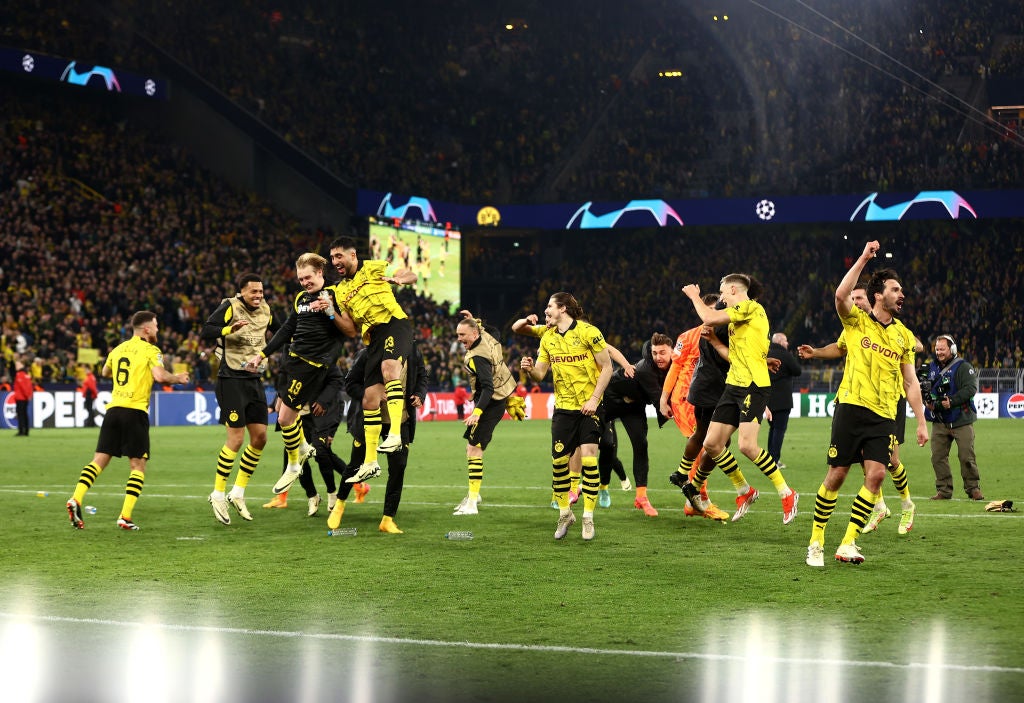Borussia Dortmund are the anti-establishment – can they be saviours of the Champions League?
Not a mega club and not state-owned, can BVB upset the odds and triumph at Wembley?

Your support helps us to tell the story
From reproductive rights to climate change to Big Tech, The Independent is on the ground when the story is developing. Whether it's investigating the financials of Elon Musk's pro-Trump PAC or producing our latest documentary, 'The A Word', which shines a light on the American women fighting for reproductive rights, we know how important it is to parse out the facts from the messaging.
At such a critical moment in US history, we need reporters on the ground. Your donation allows us to keep sending journalists to speak to both sides of the story.
The Independent is trusted by Americans across the entire political spectrum. And unlike many other quality news outlets, we choose not to lock Americans out of our reporting and analysis with paywalls. We believe quality journalism should be available to everyone, paid for by those who can afford it.
Your support makes all the difference.As Borussia Dortmund prepare for their biggest European game in 11 years, they’re also thinking about next year. There is increasing talk around the club about bringing former manager Jurgen Klopp back as head of football in 2025.
For some at Dortmund, this is the inevitable end point of a long period harking back to the 2010-13 glory era, with the club constantly rehiring familiar figures. This isn’t necessarily seen as a good thing, either. There is a strong argument it has prevented the club from progressing. They don’t even have a truly great young talent they can sell on right now, a policy that has sustained the club in past seasons.
It does still play into a vision that was created from that period, that frames these entire Champions League semi-finals even beyond their own meeting with Paris Saint-Germain. That spell saw Dortmund cast as a model for how to do football right. They had gone toe to toe with far wealthier rivals through emotionally stirring play, all fired by a raucous fanbase who were members of the club.
Such lasting qualities have now afforded them another status as the Champions League nears its climax. They are being cast as the potential “saviours” of the competition. The unexpected disruption of the Premier League’s financial power has only seen other forces fill the vacuum. PSG are an even more overt sportswashing project than Manchester City, given they are owned by Qatar Sports Investment. Real Madrid and Bayern Munich are as establishment as you can get. The Spanish club are the most successful in the competition’s history, with 14 victories, Bayern the third most successful with six. Almost more importantly in the modern game, both have been the most influential voices at European club level, essentially dictating policy and economic strategy for decades.
When Michel Platini’s exit as Uefa president left another vacuum in 2016, it was Bayern and Madrid who led the way in seeking to change regulation so the most successful clubs got more prize money. They were also influential in the move to next season’s expanded Champions League, often quipped about in the game as “the Super Champions League”.
Of course, it shouldn’t be overlooked that Dortmund were invited to join the ill-fated European Super League back in April 2021. They don’t make for the most compelling underdogs; they are still the 12th wealthiest club in the world, according to Deloitte’s Football Money League. It’s just that their wealth is still nowhere near the level of their semi-final counterparts. This is how the modern game has gone.
No one with a revenue of less than €460m has won the Champions League since 2013. That was still Bayern Munich, and they still beat Dortmund. Now, were Dortmund to somehow do it this season, they would break that trend. They have a revenue of “just” €420m last season.
The twist to all of this is that they’re nowhere near the level of previous Dortmund sides. It’s difficult to think the current team would beat even Thomas Tuchel’s side from 2015-16. The club’s approach has gone a bit stale. You only need to go through the squad: yes, it features returning stars in Jadon Sancho and Mats Hummels, but also relative journeymen in Niclas Fullkrug and Marcel Sabitzer.

Dortmund have that classic look of a team where the model has been the same for too long, and most signings sort of become top-heavy fillings of gaps. Karim Adeyemi is one of only a few players you would think represents the best of their long-term ideology. They’ve been overtaken by other German clubs, even, who have more sophisticated and modern stances on the same core philosophy.
This Champions League season consequently is an outlier. It shouldn’t put off more rigorous debates about what the club needs to flourish in the future. Yes, they’ve benefitted from a favourable draw, but their progress can also be attributed to the canny, conservative management of Edin Terzic.
That almost proves the point, though. Over the last 15 years, Dortmund have had some "golden era" teams and yet in that time they have made just one Champions League final. It would truly mean something to the club to go one step further and win it. For PSG, sure, it would mean a lot for their fans, but that is arguably tempered by the Qatar connection. Bayern Munich won this competition just four years ago. Real Madrid are perennial winners.
Dortmund, even as the model has gone stale, would be something refreshing.
Join our commenting forum
Join thought-provoking conversations, follow other Independent readers and see their replies
Comments